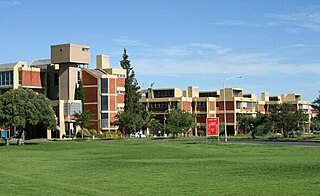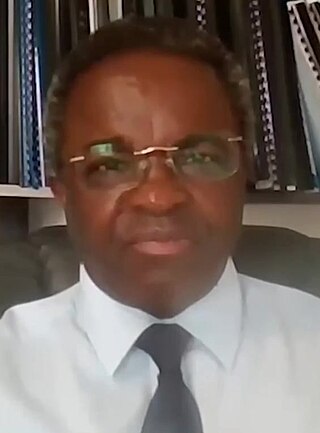Related Research Articles

Windhoek is the capital and largest city of Namibia. It is located in central Namibia in the Khomas Highland plateau area,at around 1,700 m (5,600 ft) above sea level,almost exactly at the country's geographical centre. The population of Windhoek,which was 486,169 in 2023,is constantly growing due to a continued migration from other regions in Namibia.

Samuel Shafiishuna Daniel Nujoma,is a Namibian revolutionary,anti-apartheid activist and politician who served three terms as the first President of Namibia,from 1990 to 2005. Nujoma was a founding member and the first president of the South West Africa People's Organization (SWAPO) in 1960. Before 1960,SWAPO was known as the Ovambo People's Organisation (OPO). He played an important role as leader of the national liberation movement in campaigning for Namibia's political independence from South African rule. He established the People's Liberation Army of Namibia (PLAN) in 1962 and launched a guerrilla war against the apartheid government of South Africa in August 1966 at Omugulugwombashe,beginning after the United Nations withdrew the mandate for South Africa to govern the territory. Nujoma led SWAPO during the lengthy Namibian War of Independence,which lasted from 1966 to 1989.

Khomas is one of the fourteen regions of Namibia. Its name refers to the Khomas Highland,a high plateau landscape that dominates this administrative subdivision. Khomas is centered on the capital city Windhoek and provides for this reason superior transportation infrastructure. It is located in the central highlands of the country and is bordered by the Erongo region to the west and the northwest and by the Otjozondjupa region to the north. To the east is the Omaheke region,while in the south is the Hardap region. The region is characterized by its hilly countrysize and many valleys. It has well-developed economical,financial,and trade sectors. Khomas Region occupies 4.5% of the land area of Namibia but has the highest population of any of its regions (16.2%). Khomas is one of only three Namibian regions to have neither shoreline nor a foreign border.

Samora Machel Constituency is a constituency in Windhoek in the Khomas Region of central Namibia. The constituency is located across four northern suburbs of Windhoek:Wanaheda,Greenwell Matongo,Goreangab,and part of Havana. It had a population of 50,110 in 2011,up from 29,382 in 2001. As of 2020 it had 45,962 registered voters.

Windhoek Rural is a constituency in the Khomas Region of Namibia. Its district capital is the settlement of Groot Aub. It had a population of 22,254 in 2011,up from 20,212 in 2001. As of 2020,it has 13,625 registered voters.
Okahandja is a city of 45,159 inhabitants in Otjozondjupa Region,central Namibia,and the district capital of the Okahandja electoral constituency. It is known as the Garden Town of Namibia. It is located 70 km north of Windhoek on the B1 road. It was founded around 1800,by two local groups,the Herero and the Nama.

Bience Philomina Gawanas is a Namibian lawyer who served as Special Adviser on Africa for the United Nations from 2018 to 2020.

Hage Gottfried Geingob was a Namibian politician who served as the third president of Namibia and Commander-in-Chief of the Namibian Defence Force (NDF) from 2015 until his death in February 2024. Geingob was the first Prime Minister of Namibia from 1990 to 2002,and served as prime minister again from 2012 to 2015. Between 2008 and 2012 Geingob served as Minister of Trade and Industry. In November 2014,Geingob was elected president of Namibia by an overwhelming margin. In November 2017,Geingob became the third president of the ruling SWAPO Party after winning by a large margin at the party's sixth Congress. He served as the party's president until his death. In August 2018,Geingob began a one-year term as chairperson of the Southern African Development Community.

The University of Namibia (UNAM) is a multi-campus public research university in Namibia,and the largest university in the country. It was established by an act of Parliament on 31 August 1992.

Otavi is a town with 10,000 inhabitants in the Otjozondjupa Region of Namibia. Situated 360 km north of Windhoek,it is the district capital of the Otavi electoral constituency.

McHenry Venaani is a Namibian politician and the president of the Popular Democratic Movement,a party with sixteen seats in the National Assembly of Namibia and one seat in the National Council of Namibia. Venaani has been a member of the National Assembly from 2002 to 2010,in 2014,and since 2015. At the time of his appointment in 2002,he was Namibia's youngest MP. He is one of the three candidates standing for election as Paramount Chief of the Ovaherero Traditional Authority in January 2023,competing against Hoze Riruako and Mike Kavekotora.
Breaking the Wall of Silence (BWS) is a non-governmental organization (NGO) in Windhoek,the capital of Namibia. It is named after Siegfried Groth's book Namibia. The Wall of Silence,and was formed at the occasion of the book's release in 1996.

Windhoek West Constituency is an electoral constituency in the Khomas Region of Namibia. It contains the affluent suburbs of Hochland Park,Pioneers Park,Academia,Cimbebasia,Rocky Crest,Windhoek North and Windhoek West. It had a population of 53,438 in 2011,up from 42,201 in 2001. As of 2020,it has 33,556 registered voters.

Margaret Natalie Mensah-Williams is a Namibian politician,diplomat,and prominent SWAPO member. She currently serves as Namibia's ambassador to the United States.

Panduleni Filemon Bango Itula is a Namibian politician,dentist,lawyer,and former Chief Dentist at the Katutura State Hospital,as well as a former SWAPO party school lecturer. He was an independent presidential candidate for the Presidency of Namibia in the 2019 Namibian general election and finished second (29%) after Hage Geingob. He is a founder and president of the Independent Patriots for Change in Namibia.

Hairareb is a 2019 Namibian drama film directed by Oshoveli Shipoh on his directorial debut. The film stars David Ndjavera and Claudine de Groot in the lead roles. The plot of the film is loosely based on a novel with the same title written by August C. Bikeur and the title role was played by the lead actor David Ndjavera. The film was released on 30 August 2019. Prior to the release of the film,it was regarded as one of the most anticipated Namibian films of 2019. It received critical acclaim from the critics for its narrative,direction and cinematography.
Fransina Ndateelela Kahungu is a Namibian politician serving as a Windhoek city councilor. She previously served as deputy mayor of Windhoek in 2016 and 2017 and mayor of Windhoek from 2019 to 2020. Kahungu became the SWAPO Party Women Council (SPWC) Secretary in 2022.

Squatting in Namibia is the occupation of unused land or derelict buildings without the permission of the owner. European settlers arrived in the nineteenth century and acquired land,leaving only 38 per cent of land in indigenous hands by 1902. This led to squatting and the Herero Wars,which ended with the Herero and Namaqua genocide. After Namibian independence in 1990,squatting increased as people migrated to the cities and land reform became a goal for those who had participated in the liberation struggle. By 2020,401,748 people were living in 113 informal settlements across the country. Squatting continues to be regulated by the Squatters Proclamation of 1985;a challenge to this law was dismissed by the High Court in 2023.
References
- 1 2 3 Lunyangwe, Strauss (1 November 2019). "Ex-beauty queen seeks parly seat". New Era .
- ↑ "'Job took the files' – Gawanas". 5 October 2021.
- ↑ "- The Namibian".